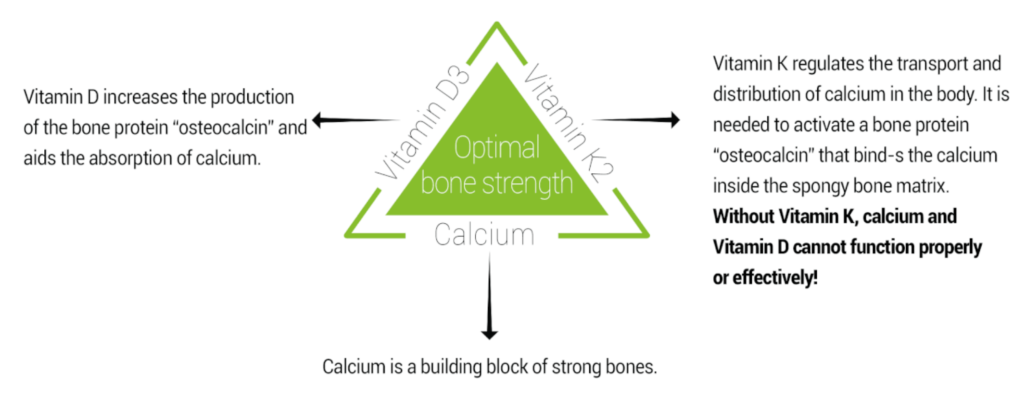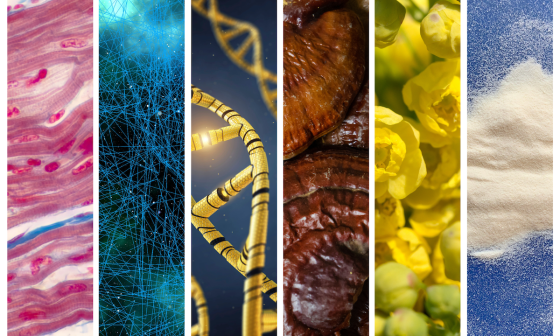Known as the “forgotten vitamin”, scientists and researchers have only started studying vitamin K2 in the last two decades for its newly found benefits despite having a long history of use. Due to this emerging research, vitamin K2 has been reborn with a new vigor, and it is starting to get the attention it deserves in the medical world.
When we think of vitamin K, we often think of the more popular and better known vitamin K1, however, these two vitamins have very different uses and properties and thus it’s important to understand vitamin K2’s benefits.
Vitamin K1 vs K2
Vitamin K1, also known as phylloquinone, is responsible for blood coagulation by activating blood-clotting proteins. This vitamin is essential for wound healing. According to the Harvard School of Public Health, K1 helps produce 4 out of the 13 proteins needed for blood clotting. Vitamin K1 is found primarily in green leafy vegetables such as green salads, broccoli, kale and spinach, and accounts for 90% of the total dietary Vitamin K intake. Unfortunately, dietary sources of Vitamin K have poor bioavailability and are not absorbed well. Supplementation is suggested.
Vitamin K2 is essential for optimal bone and heart health. It is comprised of a group of structurally similar molecules called menaquinones (MK) that differ in their chain length and biological activity. Their side chains can vary from 4-14 isoprenoid units. MK-4 and MK-7 are the most important Vitamin K2 menaquinones. MK-4 is found in meat, dairy, and eggs. MK-7 is found in fermented foods such as cheese, yogurt, and natto. MK-7 remains biologically active in the body longer than MK-4, and allows for better bodily distribution and activation. It also reaches bones and vessel walls better than MK-4.
Vitamin K2 Deficiency
In previous centuries, it was more common to eat K2-rich foods. Today, our western diets do not supply us with adequate vitamin K2 levels to provide us with its benefits.
Osteocalcin and matrix Gla-protein (MGP) are the biomarkers of Vitamin K2 deficiency. Both osteocalcin and MGP are inactive proteins. Osteocalcin brings calcium into the bone, helping to strengthen it. MGP binds to excess calcium floating around in the blood and prevents it from depositing in the arteries. Both of these proteins are activated by and therefore dependent on Vitamin K2 levels. By studying the blood samples from healthy subjects in the latest research, we can see that in the western populations, a high percentage of osteocalcin and MGP remain inactive.
Supplementation can help K2 deficiency by increasing the amount of activated osteocalcin and MGP. Research indicates that 90-120 IU of Vitamin K2 as a daily dose is sufficient to achieve sufficient osteocalcin activation. Populations that have higher doses of K2 levels in their food like Japan, were shown to enjoy some of vitamin k2’s benefits like lower bone and heart disease rates.
K2 and Bones
We all know that calcium is the building block of healthy bones. But what regulates calcium? Vitamins K2 and D3 do.
Vitamin D3 promotes intestinal uptake and transport of calcium ensuring that sufficient blood calcium levels are met for normal mineralization of collagen matrix in bone. Vitamin K2 activates osteocalcin, the protein that helps incorporate calcium into the bone matrix. Therefore vitamins K2, D3 and calcium must all work synergistically for optimal bone health to be achieved. This bone health team cannot function effectively without all 3 team members.
Age groups at highest risk
Children need high levels of vitamin K2 to support their rapid growth. Recent studies have shown that K2 levels in children are low and that inactive osteocalcin is more abundant than the active form when compared to other age groups.
Osteoporosis, a condition characterized by the loss of bone density over the years resulting in porous bones, is common among older females. Clinical studies show that supplementing with MK-7 in postmenopausal women reduces the rate of age-related decline in bone mineral density.

Vitamin K2, D3, and calcium depend on one another for good bone health. The team cannot function effectively without all 3 team members.
K2 and Heart Health
Excess calcium in the body can accumulate in blood vessels and arteries. Proper calcium utilization is not only essential to bone health, but to cardiovascular health as well. Calcification in arteries reduces the elasticity of vessels and can can lead to heart disease. Another one of key benefits of Vitamin K2 benefits is that it activates MGP which binds to free floating calcium, preventing it from being deposited in vessels and arteries. Low K2 levels result in higher levels of inactive MGP, which is unable to bind to calcium. Higher levels of non-activated MGP typically occur in people aged 65 and older, and people with rheumatoid arthritis, aortic valve disease, aortic stenosis, heart failure, chronic kidney disease and patients taking vitamin K antagonists.
This clinical study shows a significant reduction in arterial stiffness and slower progression of calcification after supplementing with K2. A double-blinded randomized placebo controlled clinical trial of 244 healthy postmenopausal women supplemented with either 180 ug of MK-7 or a placebo, over a period of 3 years. The stiffness index in those with elevated arterial stiffness at baseline was significantly improved in the MK-7 group compared to placebo. Those taking MK-7 also experienced a 50% decrease in non activated MGP compared to placebo.
K2 During Pregnancy
Pregnancy is a time when the body’s demand for calcium is very high. The mother’s body is going through substantial skeletal change, and the fetus is growing a new skeleton altogether! K2 is important during this time as it works synergistically with D3 to support bone health in both the mother and baby, and reduces bone related pain that some expecting mothers experience. Motohara et al. (1990) revealed that women who were given 20 mg of vitamin K2 about a week before they gave birth had more K2 in their blood compared to the control group. K2 levels were also elevated in the umbilical cord, indicating increased transfer of K2 to the baby. Therefore, none of the newborns of K2-treated mothers showed signs of deficiency at birth, compared to 90% of children whose mothers were not given K2.
Practitioners & VitaminLab
If you’re a practitioner interested in creating custom supplement formulas for your patients, please reach out to info@getvitaminlab.com for more information. VitaminLab carries vitamin K2 (MK-7), along with 130+ other bioavailable ingredients that contain no artificial fillers, added sugars or magnesium stearate.
If you’d like to read more nutrition focused articles, be sure to check out our latest posts on the VitaminLab Blog.






